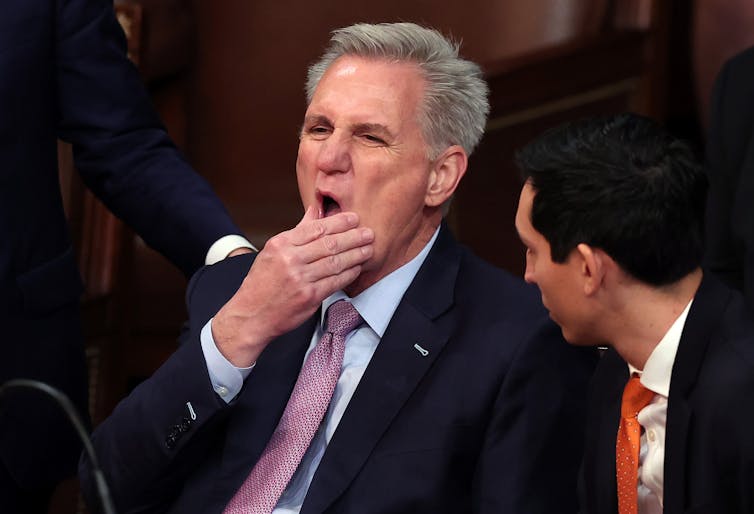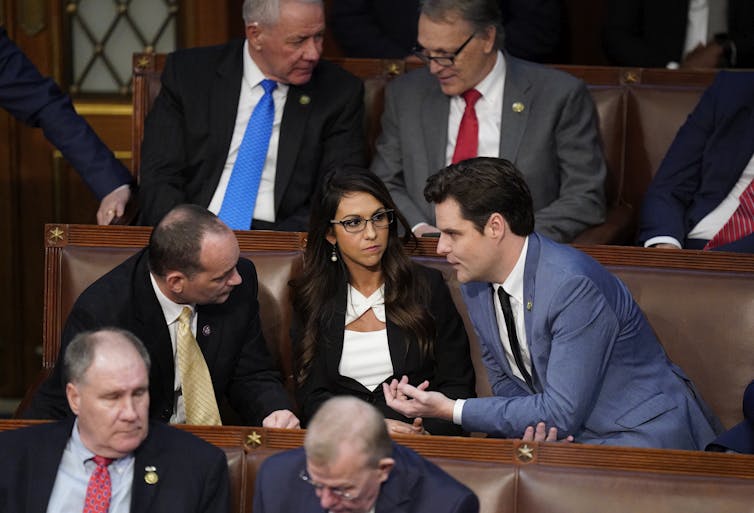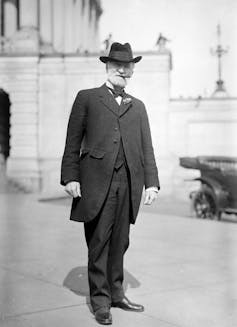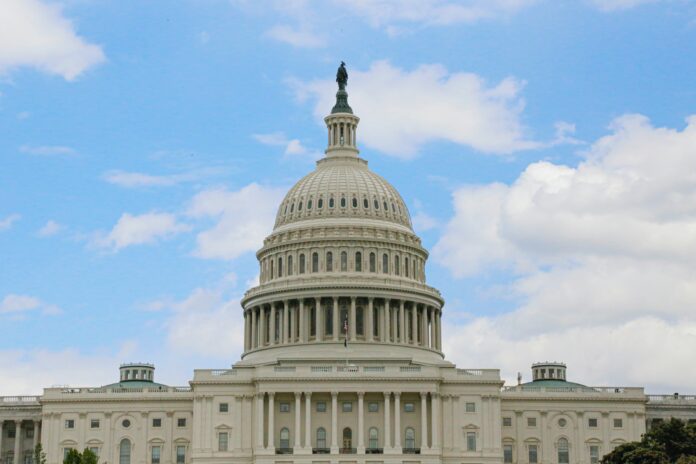It’s been a week of Speaker of the House chaos – we have some questions, and a few answers

By Rachel Paine Caufield, Drake University
It is fair to say that the beginning of the 118th U.S. Congress has not gone entirely to plan.
In the space of four days, members-elect of the House of Representatives have held more than a dozen votes over who would take on the role of speaker. Yet, as of the afternoon of Jan. 6, 2023, the position remains unfilled.
As a result, representatives have not been sworn in to start the job they were elected to do. The sticking point: A dwindling group of holdout conservatives in the GOP are refusing to toe the line and fall behind the party leadership’s preferred candidate, Rep. Kevin McCarthy of California.
The Conversation had a plethora of questions over what this means for governance, and the authority of the speaker – whoever that may be. So we put them to Rachel Paine Caufield, an expert on all thing Congress at Drake University.
Can the House do any other business while there is no speaker?
In short, no. The only business being done in the U.S. House of Representatives at the moment is voting for the role of speaker.
No other business can proceed until a speaker is in place. And this is for one very simple reason: No representatives can be sworn in until there is a speaker. So right now we have no formal representatives serving in the House of Representatives, and as a result no one has the legal authority in the House to carry out the work of government.
Other usual House activity, such as briefings on issues including security, is also not happening. Would-be representatives can’t be briefed yet because they have not been sworn in.
They can still meet with constituents. But they can’t make any formal request of government, because they are just representatives-elect until they are sworn in – and that applies to both new members of the House as well as returning members.
Does it affect the Senate?
The Senate can still operate, and there are certain things the Senate alone is responsible for, such as ratifying treaties and confirming judicial nominees.
But any legislation needs to go through both the Senate and the House – so no laws can be passed until a speaker is in place.
Can unofficial business be done in the House?
Certainly representatives are meeting while this situation is going on. My guess would be that the Democrats – who are unified in their support of Hakeem Jeffries as their nominee for speaker – are having conversations about future legislative activity.

For the Republicans, the priority right now is how to navigate this impasse over the speaker position. But don’t think that some of those discussions are not also about legislation. The holdouts in the GOP are looking for concessions on things such as term limits for representatives – and that is a legislative issue; they will need to pass law on it.
But for the most part, the fight over the speakership is the only issue in town.
What is the U.S. missing out on in terms of House business?
If you look at the House calendar for the first few weeks of the year, there isn’t an awful lot on it.
In the first few days, normally you would have the selection of the speaker and swearing in of members. And then they would traditionally break. There wasn’t expected to be a huge amount of legislation being pushed straight out of the gate.
One thing that is being delayed is a revision of the rules of the House of Representatives – something that happens at the beginning of each session of Congress. A rules package decides what the rules of the House will be in that session; then representatives get down to legislative business.
You have to keep in mind that legislative activity is heavier at the end of sessions – and we just finished a session of Congress in December. If legislation doesn’t pass in the House and the Senate in a single two-year session, then it dies – so there is no leftover business from last year; everything starts over again.
As a result, you traditionally don’t see a lot of dramatic legislative activity early in a House session.
But what happens if the impasse continues?
The one pressing thing the House has coming up that is not being dealt with is a vote over the raising of the debt ceiling.
Congress needs to raise the debt ceiling this spring; otherwise the U.S. will default on its obligations.
But the House still has four or five weeks until this really is a pressing issue – and brinkmanship is common when it comes to the debt ceiling, so expect that to be a protracted debate and negotiation in any case.
Can this situation continue forever?
Yes. The U.S. Constitution identifies only three congressional roles that need to be filled – the speaker of the House is one, the other two being the president of the Senate (the constitution designates that the vice president of the U.S. fills this role), and the Senate president pro tempore, a ceremonial position to serve as the president of the Senate if the vice president can’t fulfill his or her Senate duties.
So there does need to be a speaker in place. The Constitution requires only that the House shall elect a speaker, but doesn’t specify how or lay out a time frame – they can vote for weeks or even months.
By tradition, the speaker is elected by a majority of the House – so right now that would mean 218 representatives, assuming all are present and voting. Although the House rules currently specify that a majority is needed, that can be changed – it isn’t in the Constitution. The GOP could lower the vote majority needed to 213 to push McCarthy over the line, although they wouldn’t go lower as that could allow the Democrats to select Jeffries, who already has the support of all 212 Democrats in the House.
Hang on! If representatives aren’t sworn in, who can change the House rules?
That could come down to the clerk’s office that is currently presiding over the House session. In the same way that the clerk’s office is allowing representatives-elect to nominate speakers, they could allow a motion putting forward a change in the House rules.
It has never happened before, and it would raise a number of procedural questions – but theoretically it is possible.
Who can be a House speaker? We have heard a lot of names
The Constitution has no rules whatsoever about who can and cannot be the House speaker. Representatives-elect can nominate – and even elect – someone who is not a member of the House to be speaker. That is why you have seen Donald Trump be nominated by one member; someone even joked about former speaker Newt Gingrich.
There are requirements for serving as a member of the House of Representatives – you have to be over the age of 25, a U.S. citizen for at least seven years and live in the state from which you were elected. But as a speaker doesn’t have to be a member of the House, these rules don’t apply. So you could, theoretically, nominate a 7-year-old German child.
Could Trump really be the speaker?
Constitutionally, yes. Practically, no. There seems to be very little appetite for this among GOP members in the House – he only received one vote, and may not want the job in any case.
How has this all affected the authority of the role of Speaker?
The short answer is we don’t know yet. The fact that it has taken this many votes and still we don’t have a speaker in place in itself will have an effect. It indicates a divided majority party that will be difficult to lead – that in itself will diminish the power of the role.
Any concessions struck to reach a deal over the speakership could further erode the speaker’s authority. What is being negotiated by holdouts in the GOP are largely measures to empower individual members at the expense of party leadership.
This isn’t that uncommon. Over history the power of the speakership has ebbed and flowed.

One of the most powerful speakers in U.S. history, “Uncle” Joe Cannon, was removed in 1910 by his party for that reason – they thought the speaker had too much power. In 1974, the influx of so-called “Watergate babies” – a group of northern liberal Democrats elected as part of a backlash after Watergate – led to an effort to diminish the power of committee chairs in the House. The rules changes left a vacuum that was filled by the speaker, with the result that the power of the position increased.
That all said, what is being discussed is unheard of. The main concession – a change to the “motion to vacate the chair” rule so that any one member, or a small number of members, can initiate a process that is effectively a vote of no confidence – has never been tried before.
Another request by the GOP holdouts is to open the rules on the house floor so that any member can propose amendments to any bill. There are 435 members, and all have pet projects and constituent needs. Such a change would be chaos. In effect, it would mean that 435 people will be involved in the making of the legislative sausage right on the house floor.
Will any concessions be binding?
They don’t necessarily have to be adopted by future speakers, no. Some will have to be adopted in a new rules package for the House, but the rules package is changed every new session, so they won’t be binding forever. Indeed, some Democratic representatives have indicated that if concessions are made, they would potentially challenge the rules package or vote against some of the most extreme measures that holdouts are demanding.
Some of the concessions being discussed won’t need a rule change at all. They are, in effect, agreements between different factions in the Republican Party. For example, a concession that the GOP leadership will not use its SuperPac to favor candidates in open Republican primaries – that is something that can’t be dictated by House rules; it is more an issue of trust.![]()
Rachel Paine Caufield, Professor of Political Science, Drake University
This article is republished from The Conversation under a Creative Commons license. Read the original article.
Top image by Syed F Hashemi on Unsplash



